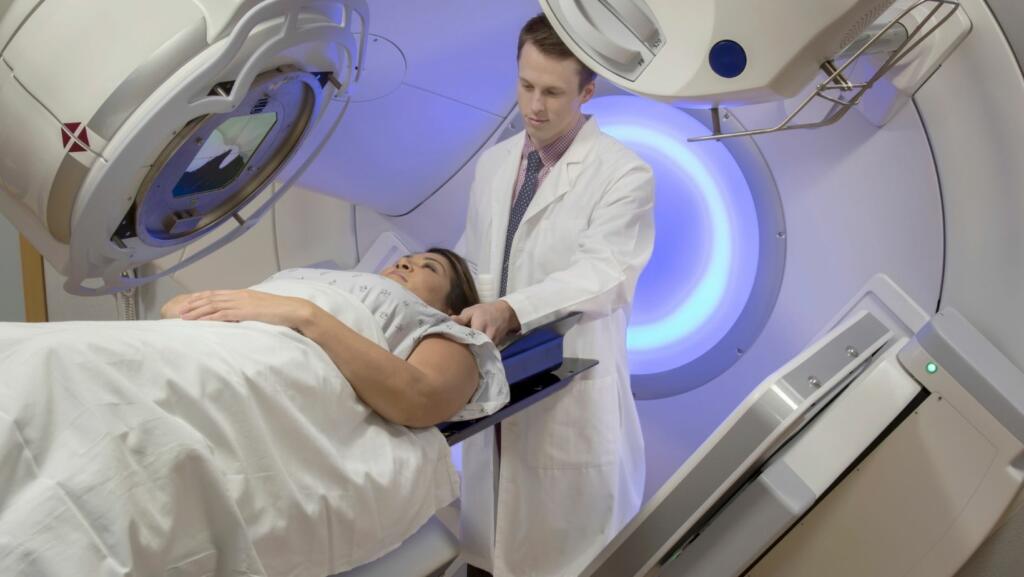1. What is metastatic breast cancer?
We call the traveling of cancer cells to other body parts Metastases.
Cancer cells can multiply faster than healthy cells and move through the lymphatic pathways and blood vessels.
Some migrating cells die on the journey, while others survive and reach distant organs.
Metastatic breast cancer originates from the breast and spreads to other body parts.

Metastatic breast cancer is stage IV of Breast cancer primarily affecting Bones, lungs, liver, and brain.
Metastases can occur after a few years from the onset of the primary tumor or after many years in some rare cases.
2. Is metastatic breast cancer curable?
Women with metastatic breast cancer live with a chronic disease.
It is necessary to distinguish it from non-metastatic breast cancer because they are two different conditions.
Metastatic breast cancer is treatable and, therefore, can be subjected to therapy, controlled, and sometimes go into complete remission for a certain period except in some exceptional cases.
Non-metastatic breast cancer, on the other hand, especially if diagnosed at an early stage, and managed in a timely and timely manner in a Breast Cancer Centre, is considered curable.
Breast cancer can relapse even after several years, but the probability of developing metastases depends on many elements.
3. Causes of Metastatic Breast Cancer
Breast cancer becomes metastatic after cancer cells infiltrate surrounding tissues.
It penetrates the blood and lymphatic vessels and, being carried away by blood and lymph, spreads to other organs and tissues in the body.
The metastases’ invasion of the organs and tissues follows when cancer cells have reached the capillaries. The neoplastic cells stop their course beginning to deposit and divide on the capillary wall, and, at some point, they cross it, migrating to neighboring organs and tissues.
The penetration of the capillary wall by cancer cells is possible because the resistance of the capillary wall to metastases is inferior.
On the new organs and tissues reached, metastases initiate neoplastic growth processes, which end with the formation of small new tumors.
4. Which Organs Does Metastatic Breast Cancer Affect?
Diffuse metastases from breast cancer can affect:
- The closest lymph nodes, i.e., the lymph nodes in the armpit;
- The skin of the breast;
- The bones;
- The lungs;
- The liver;
- The brain.
Some metastatic breast cancers affect all the organs mentioned above, others only a part.
metastatic breast cancer symptoms
Symptoms of metastatic breast cancer vary depending on where the metastases have spread.
A. Breast Cancer with Bone Metastases
Bone metastases spread by breast cancer usually cause:
- Diffuse acute pain;
- Tendency to fractures;
- Hypercalcemia (due to metastases, calcium escapes into the blood from the bones)
- Hypercalcemia causes nausea, constipation, loss of appetite, tiredness, and weakness.
Breast cancer can spread metastases to any component of the human skeleton; however, it tends to favor the ribs, spine, pelvis bones, and long bones of both upper and lower limbs.
Bones represent breast cancer, the leading site of the body in which metastases spread.
B. Breast cancer with lung metastases
The presence of lung metastases due to breast cancer can manifest itself with:
- Dyspnea;
- Cough and hemoptysis (coughing up blood);
- Chest pain
- Fatigue.
However, breast cancer-induced lung metastases often do not cause apparent disturbances.
C. Breast Cancer with Cerebral Metastases
Brain metastases from breast cancer are typically responsible for:
- Headache (headache);
- Blurred or double vision;
- Confusion;
- Memory loss;
- Speech problems
- Balance disorders;
- Sudden changes in mood;
- Epilepsy;
- Dizziness;
- Motor difficulties.
D. Breast Cancer with Liver Metastasis
Liver metastases resulting from breast cancer can cause:
- Pain in the central area of the body;
- Fatigue and weakness;
- Loss of weight and appetite;
- Sense of swelling;
- Edema in the lower limbs;
- Jaundice;
- Fever.
Liver metastases are often asymptomatic
5. How is metastatic breast cancer diagnosed?
Diagnosis of metastatic breast cancer may require numerous investigations.
A biopsy of the tumor mass detected in the breast is needed. Subsequently, all those investigations are required to identify the metastases disseminated in the body.
A. Biopsy

The biopsy is the examination that allows ascertaining the presence of breast cancer and the progress of the latter based on the cellular characteristics of the tumor mass.
The biopsy involves two phases, which, in temporal order, are:
- Doctors use clinical-instrumental investigations to sample cells from the suspicious mass identified at the breast level. Such analysis includes a physical examination, mammography, ultrasound, and magnetic resonance.
- Essential to establish the malignant nature of the suspect mass and its stage of advancement.
B. Research on Bone Metastasis
For the diagnosis of bone metastases, Doctors use
- Bone scan;
- X -rays;
- The CT scan;
- Nuclear magnetic resonance;
- The PET.
Sometimes, we require a blood test to measure the blood levels of two substances typically elevated in bone metastases: calcium and alkaline phosphatase.
C. Lung Metastasis Research
For detecting lung metastases, a CT scan or PET scan is sufficient.
To these investigations, however, doctors almost always add in-depth examinations, the purpose of which is to ascertain that observations are indeed metastases and not a primary lung tumor; the in-depth tests in question include:
- The microscopic analysis of the cells presents in a sample of spit-emitted mucus;
- Bronchoscopy; _
- Pulmonary needle biopsy.
D. Research of Cerebral Metastases
Brain metastases are visible on magnetic resonance imaging of the brain, performed with a contrast medium.
Only in rare cases do doctors prescribe a confirmation biopsy.
E. Research on Liver Metastasis
For the detection of liver metastases, the classic diagnostic procedure includes:
- Liver function test
- Imaging tests, such as MRI, PET, CT, and ultrasound
- Biopsy.
There are two ways to perform the biopsy: by needle or laparoscopy.
F. Metastatic breast cancer Therapy
Unfortunately, even Today, metastatic breast cancer is a condition that is impossible to cure, except in sporadic cases.
There are various treatments; this is true. However, these treatments serve more than anything else to control the neoplasm’s complications, alleviate the symptoms, and prolong the life of patients as much as possible, obviously paying attention to the quality of their existence.
It is interesting to note that the therapies adopted in metastatic breast cancer are the same as those for a less severe stage of breast cancer. However, while the treatments have a substantially palliative purpose in the first circumstance, they can prove fundamental for recovery in the second situation.
It leads to the following conclusion: metastatic breast cancer is considered a very different neoplasm from non-metastatic breast cancer.
6. metastatic breast cancer treatment
Currently, therapeutic options for the treatment of metastatic breast cancer include:
- Surgery
- Chemotherapy
- Radiotherapy
- Antitumor hormone therapy
- Targeted therapy
- Immunotherapy
The choice of the treatment or treatments to be adopted is up to the treating physician, who decides based on age, general health condition of the patient, location and size of the tumor, location and extent of metastases, and previous anticancer treatments.
A. Surgery

In Surgical treatment for metastatic breast cancer, Doctors eliminate the tumor mass by total mastectomy and removing the neighboring lymph nodes affected by the neoplasm.
Surgical therapy effectively relieves symptoms when metastatic breast cancer is of the de novo type rather than distant recurrence.
In liver metastases, surgery for metastatic breast cancer could also include an operation to remove the aforementioned neoplastic formations present in the liver (Doctors require particular conditions for this further operation).
B. Cryoablation for Metastatic Breast Cancer
For a short time, there has been an alternative to traditional surgery to treat metastatic breast cancer: this is the so-called cryoablation.
Currently, Doctors use cryoablation mainly in all those cases in which there are contraindications to classical surgical therapy.
C. Chemotherapy

Chemotherapy consists of administering drugs (the so-called chemotherapy) capable of killing all rapidly growing cells, including cancer cells.
In metastatic breast cancer, chemotherapy is used as a remedy to alleviate the symptoms as much as possible.
Doctors use chemotherapy in cases where the neoplasm has caused lung and liver metastases.
Some chemotherapeutics effectively treat metastatic breast cancer: cyclophosphamide, doxorubicin, paclitaxel, and capecitabine.
D. Radiotherapy

Radiation therapy involves exposing the tumor mass to a specific dose of high-energy ionizing radiation (X-rays) to destroy cancer cells.
In the presence of metastatic breast cancer, radiotherapy is a treatment that allows you to:
- Control the pain;
- Stop tumor growth in a particular area;
- Contain the effects of bone metastases (e.g., fractures);
- Reduce bleeding due to skin metastases;
- Improve breathing if any lung metastases are symptomatic.
E. Antitumor Hormone Therapy
Antitumor hormone therapy consists of administering specific hormones or hormonal antagonists capable of interrupting the growth mechanisms of tumors.
In the presence of metastatic breast cancer, Doctors may use anticancer hormone therapy when the neoplasm is positive for estrogen and progesterone receptors.
Examples of drugs for anticancer hormone therapy adopted against metastatic breast cancer: are tamoxifen and aromatase inhibitors.
F. Targeted Therapy
Targeted therapy uses medicines capable of counteracting everything that promotes the growth and development of cancer cells.
Doctors suggest using drugs such as trastuzumab, bevacizumab, and everolimus against metastatic breast cancer.
G. Immunotherapy
Immunotherapy uses cells or proteins of the human immune system capable of recognizing cancer cells and attacking them to destroy them.
Examples of drugs for immunotherapy implemented against metastatic breast cancer: are atezolizumab and pembrolizumab.
7. How long can you live with metastatic breast cancer?
The prognosis for metastatic breast cancer is generally poor.
According to reliable estimates, for metastatic breast cancers, the 5-year survival rate after their diagnosis is 25%; less than 1/3 of women with metastatic breast cancer are still alive five years after diagnosis.
In such a context, a comforting fact is that medicine continues to improve therapies to control symptoms and prolong the life of patients with metastatic breast cancer.
8. Conclusion
Metastatic breast cancer is a chronic disease.
Each woman is unique, as is the story of each and how they cope with metastatic disease.
Some women manage to maintain a good quality of life, despite living with an illness that requires frequent checks and examinations, approximately every three months—knowing that there is often no possibility of recovery.
Thanks to the progress of scientific research, Today, we are managing to offer women more effective and personalized treatments improving their quality of life.
Those who suffer from it more can better control the symptoms and the progress of the disease by slowing down its progression in several cases.








